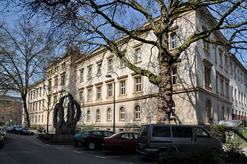 Today, the District Court (Landgericht) Dortmund announced that it had granted four Pakistani plaintiffs, who are either victims or relatives of victims of a fire in a textile factory in Karachi, legal aid (Prozesskostenhilfe) to pursue their damages claims against KiK, a German textile retailer, in the German courts. On September 11, 2012, fire broke out during the late afternoon shift at a factory in Karachi and killed nearly 300 people. It was reported that hundreds of workers were trapped inside the factory, as the building had metal grilles on the windows and no fire exits. KiK did not operate the factory directly or indirectly, but sourced goods from the Pakistani operator of the factory (see here for the BBC’s coverage of the incident).
Today, the District Court (Landgericht) Dortmund announced that it had granted four Pakistani plaintiffs, who are either victims or relatives of victims of a fire in a textile factory in Karachi, legal aid (Prozesskostenhilfe) to pursue their damages claims against KiK, a German textile retailer, in the German courts. On September 11, 2012, fire broke out during the late afternoon shift at a factory in Karachi and killed nearly 300 people. It was reported that hundreds of workers were trapped inside the factory, as the building had metal grilles on the windows and no fire exits. KiK did not operate the factory directly or indirectly, but sourced goods from the Pakistani operator of the factory (see here for the BBC’s coverage of the incident).
The plaintiffs in the German litigation argue that KiK is liable for damages under Pakistani law, since it failed to make sure that its supplier observed the applicable workplace safety and fire protection standards, even though it had agreed a so-called Code of Conduct with its supplier that dealt with work conditions and workplace safety. The plaintiffs argue that the fact that KiK demanded that its Pakistani suppliers adhered to the Code of Conduct it had established led to a legal obligation on KiK’s part to supervise the suppliers’ compliance with the Code of Conduct. KiK’s position is that compliance with the Code of Conduct had been supervised by independent third parties, that the Code was of a non-binding nature, and did not create a legal obligation to supervise its suppliers.
According to today’s press release, the Dortmund court has held that the question whether KiK is liable for damages is governed by Pakistani law. Legal aid was therefore granted to further pursue the litigation in order to determine the position under Pakistani law. The Dortmund court is now instructing an expert to provide an opinion on Pakistani law.
This case is interesting for a number of reasons. First, it is a type of litigation that one would usually associate with the U.S., and not so much with Germany. I cannot recall similar cases where tort claims were brought by workers in developing countries against German importers. Secondly, if the matter progresses to a ruling on substantive points of law, it will be a major test case on the legal standing of codes of conduct. In turn, this could have far-reaching implications on corporate social responsibility schemes in this, and other jurisdictions.
On some of the more technical points: The Dortmund court has jurisdiction since KiK is domiciled in its court district. Under German law, legal aid is to be granted to impecunious parties, according to Section 114 German Code of Civil Procedure (ZPO), “provided that the action they intend to bring […] has sufficient prospects of success and does not seem frivolous.” The Dortmund court therefore will have carried out a summary assessment of the arguments under Pakistani law that have been put to the court in the statement of claim, and has satisfied itself that the claims were neither frivolous, nor without merit. The planitffs are seeking damages in the amount of EUR 30,000 each – that is, of ourse, very different from what one would expect in U.S. litigation, but reflecting the fact that German courts are very reluctant to make large damages awards.
The photo shows the Dortmund court house, built between 1880 and 1885.
